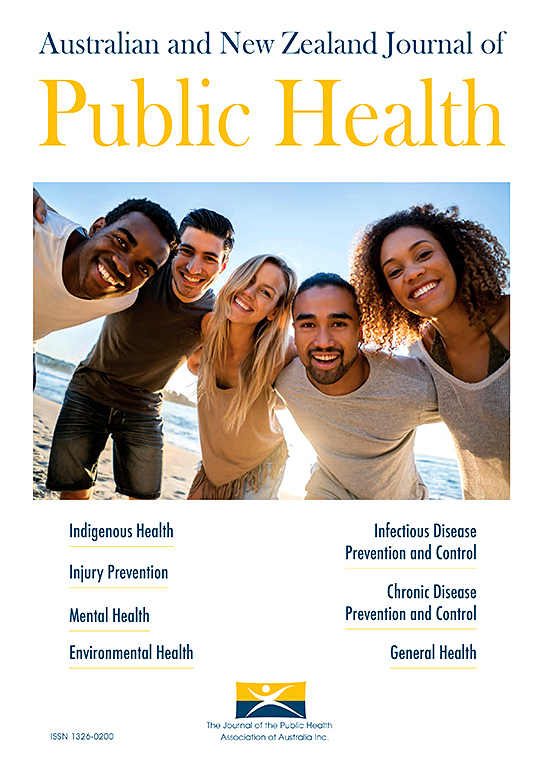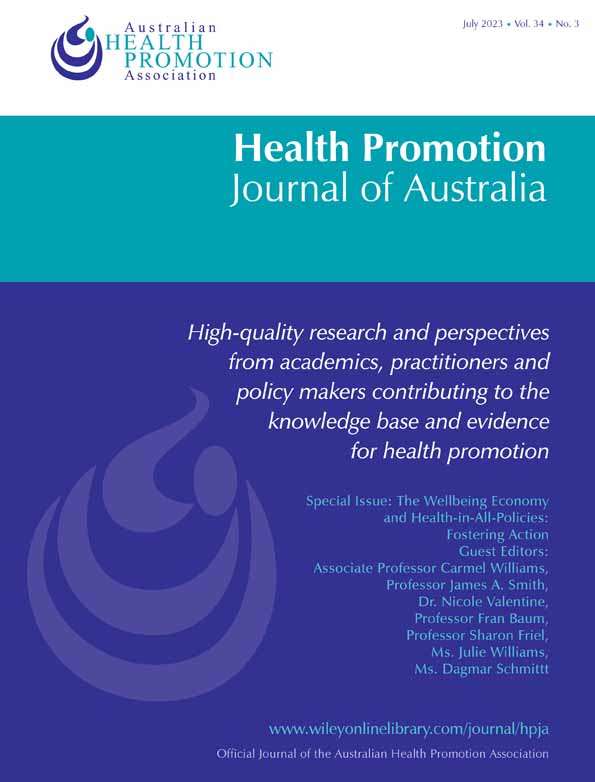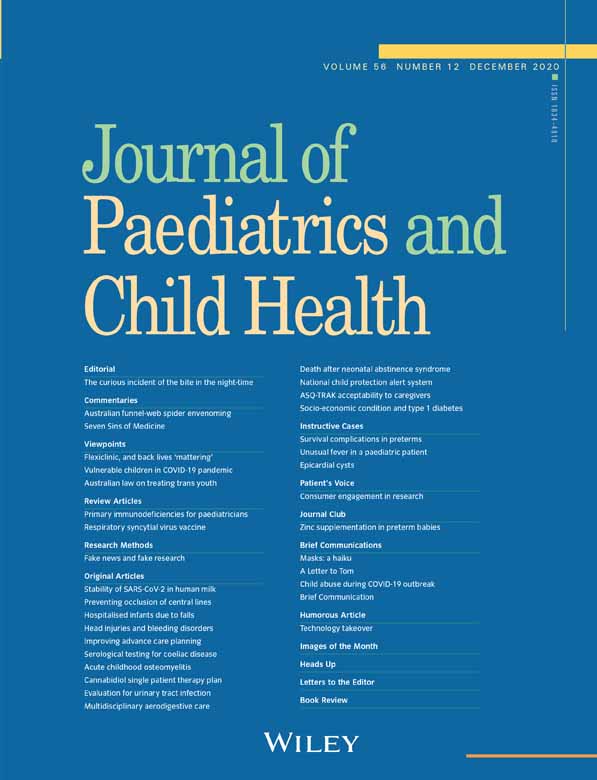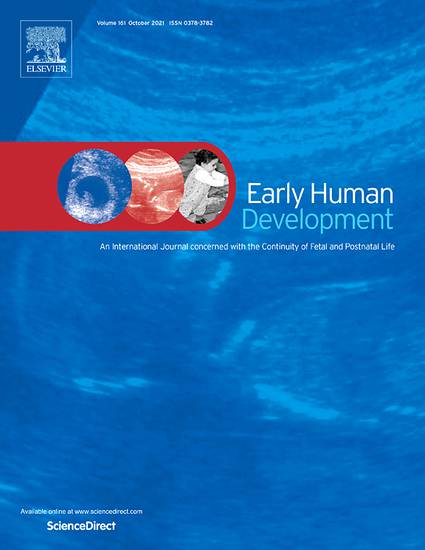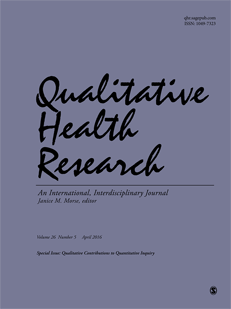In 2020 the team secured a MRFF Preventive and Public Health research grant for a new project - developing the first culturally appropriate developmental outcome measure for Aboriginal and Torres Strait Islander children - the ASQ-Steps for Measuring Aboriginal Child Development (ASQ-STEPS). This grant application built on preliminary work supported by the Northern Territory Department of Education. To learn how the ASQ-STEPS differs to the ASQ-TRAK, click here.
Following successful development and pre-testing of the ASQ-STEPS between 2018 -2021, the next phase of research is the Validation study (2022-2025). The ASQ-STEPS will be implemented in sites across Australia to determine how accurately it measures child development in the Aboriginal and Torres Strait Islander population (validity), with replicable results (reliability). Once this project is finished, the ASQ-STEPS will help us:

With support from the Department of Social Services (DSS) Early Childhood Targeted Action Plan, we are working to fill existing gaps in culturally appropriate developmental screening for Aboriginal and Torres Strait Islander children. This project will extend the existing ASQ-TRAK to include all 21 age intervals aligned with the mainstream Ages & Stages Questionnaires® (ASQ®-3). Alongside the development of 14 new ASQ-TRAK questionnaires to increase the scope of screening for children aged one month to 5 ½ years, we are updating the tool to increase the accessibility and diversity of the items and illustrations (see overview here). This responds to the needs of stakeholders and the increasing demand for the full suite of ASQ-TRAK age intervals. Ultimately, the goal is to increase the overall screening rates within the Aboriginal and Torres Strait Islander population.
In collaboration with the Department of Employment, Skills and Education Connected Beginnings program, we have employed an Aboriginal Community Engagement Officer to lead community consultation in the Connected Beginning sites to explore their interest in the ASQ-TRAK.
This project is being undertaken in partnership with the Ngaanyatjarra Pitjantjatjara Yankunytjatjara Women’s Council (NPY Women’s Council), supported by the Melbourne Disability Institute. We will look at developing an evidence base for the delivery of best practice early childhood early intervention models that meet the cultural needs of First Nations children with a disability, their families and communities. The project will also assist in the larger task of providing evidence to inform guidelines around the funding of therapy.
Funded by the Department of Health and Human Services, this project engaged with Victorian services about the ASQ-TRAK and developed the administrative infrastructure and educational framework required for Victorian practitioners to obtain the ASQ-TRAK and use it with fidelity. The ASQ-TRAK was introduced to Victorian services through engagement with several lead Aboriginal Community Controlled Organisations (ACCOs) and Aboriginal Maternal and Child Initiative (AMCHI) sites. Once engaged, training workshops were delivered. This project aimed to improve equitable access to culturally safe developmental care for all Australian children.
In partnership with, and funded by, the Northern Territory Department of Education, this project undertook the initial development of the ASQ-STEPS for Measuring Aboriginal Child Development (ASQ-STEPS) to address the absence of a psychometric measure for Aboriginal and Torres Strait Islander children. This type of tool can be used to assess individual children’s developmental progress and evaluate the impact of early intervention programs on children’s development. The output of this project was a prototype of the ASQ-STEPS ready for the next phase of research: pre-testing and validation.
Yes, the ASQ-TRAK has been validated for use in the Aboriginal and Torres Strait Islander context.
Validation refers to the process of gathering evidence to support the interpretation and use of an instrument, and the decisions we make based on that instrument. Current perspectives consider validity in terms of degree, as opposed to a tool being "validated" or "not validated". Validation is an ongoing process in which a number of sources of evidence can offer support for the validity of an instrument.
To read more about the validation studies we have undertaken, click The ASQ-TRAK: Validating a culturally adapted developmental screening tool for Australian Aboriginal children and Validation of a culturally adapted developmental screening tool for Australian Aboriginal children: Early findings and next steps.
The ASQ-TRAK is a developmental screening tool intended to identify children with potential developmental difficulties who should be referred for a more in-depth assessment. Screening tools may not be sensitive enough to accurately measure change over time or the impact of an intervention. To read more about the use of screening tools for other purposes, see Developmental Screening Measures: Stretching the Use of the ASQ for Other Assessment Purposes.
The ASQ-Steps for Measuring Aboriginal Child Development (ASQ-STEPS) is a developmental outcome measure. This means it can be used to measure an individual child's developmental progress and for evaluating the effectiveness of early childhood programs and interventions. It is a continuous measure that can be used with children aged 1 month to 3 years. The ASQ-STEPS is still being developed and researched so is not yet available for use in practice.
The ASQ-TRAK is a developmental screening tool, while the ASQ-STEPS is a developmental outcome measure. They provide different information about a child's development and are administered in different health and education contexts. The ASQ-STEPS will not replace the ASQ-TRAK. It will be an additional culturally appropriate tool for use in evaluation and individual assessment.
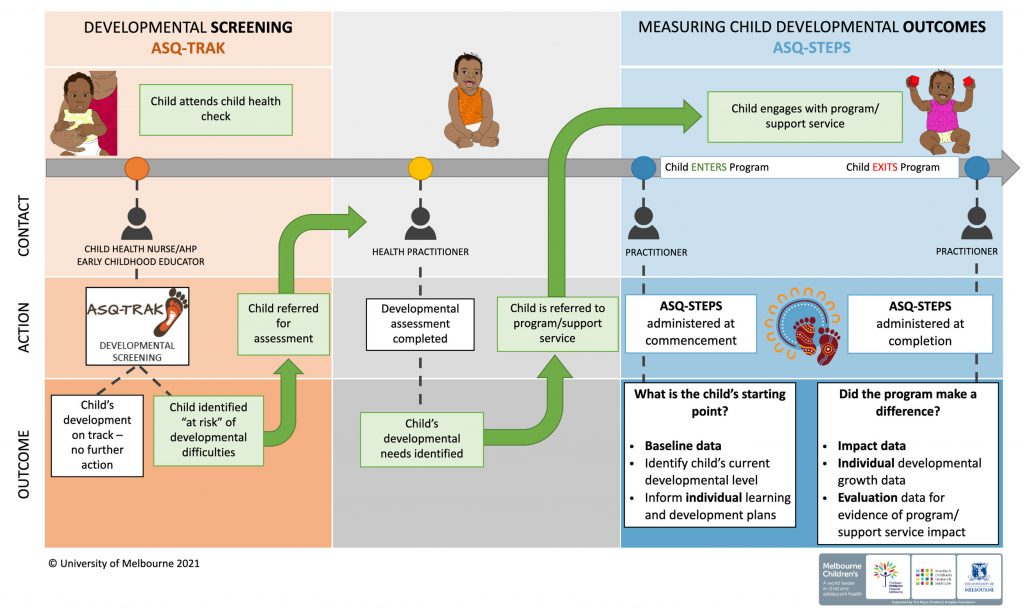
Watch a short video explaining the difference.
The STRONG kids STRONG future team conducts activities focused on the research, development, training and implementation of culturally appropriate development measures for Aboriginal and Torres Strait Islander children. The two measures we are focused on at present are the ASQ-TRAK and ASQ-STEPS.
We are currently exploring funding opportunities for an evaluation of an ASQ-TRAK implementation support model. This will explore what is necessary to support the faithful and sustainable implementation of the ASQ-TRAK developmental screening tool so that all Aboriginal and Torres Strait Islander children have access to the culturally adapted tool.
If you are interested in collaborating on current or future projects, we would love to hear from you. Please contact us to find out more. Aboriginal and Torres Strait Islander people are especially encouraged to reach out if interested in exploring research or employment opportunities. Read more about a PhD scholarship opportunity here.
